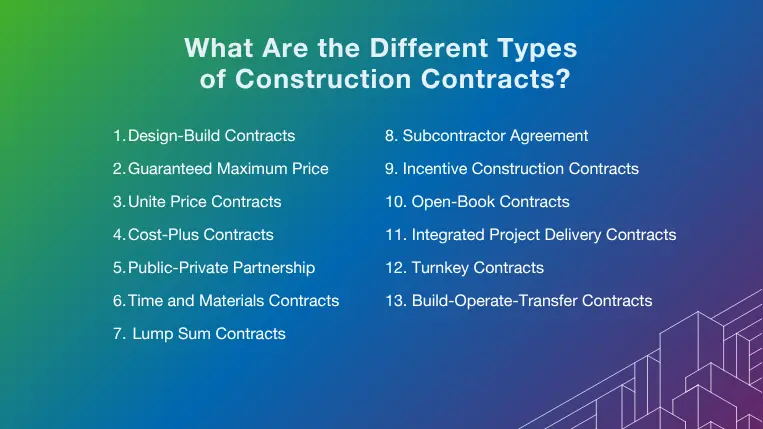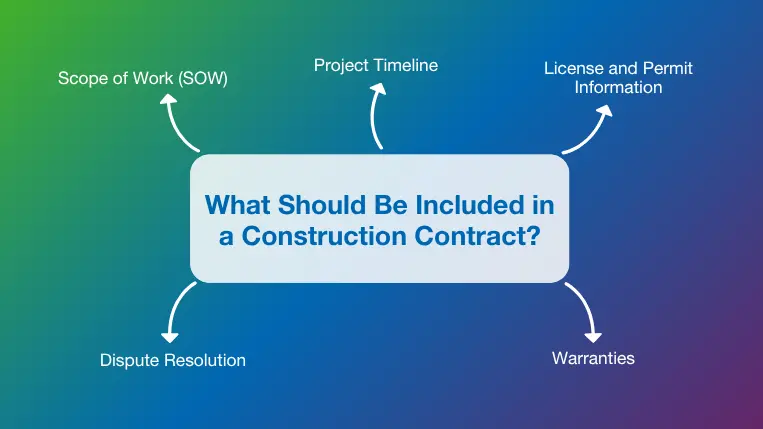10 mins read
Exploring Different Types of Construction Contracts

The world of construction is complex, where countless details and moving parts must align perfectly. Construction contracts serve as the essential framework guiding each project from concept to completion. Understanding a construction contract’s intricacies is essential for all parties, including owners, contractors, subcontractors, and developers, to ensure a project transpires seamlessly.
In this blog post, we review the various construction contract types, and the important considerations that go into selecting the right format, content, and clauses. We also take a closer look at construction contracts around the world to gain a better understanding of the organizations and standard practices governing these activities for each region.
What Are Construction Contracts?
Construction contracts are agreements between different players involved in a construction project, including the owner of the project, who contracts the work; the contractor, who performs the work; and, in some cases, subcontractors, who perform portions of the work.
The primary purpose of construction contracts is to clearly state the scope of work, the tentative schedules of the project, cost estimates, and payment timings. One example is a standard form contract, which is an agreement essential for guaranteeing uniformity, reducing risks, and expediting procedures. These pre-prepared agreements use standardized terms and conditions that parties can utilize repeatedly for comparable transactions.
Construction contracts reduce risks involved when managing a project to ensure its success. Written agreements also help to avoid any possible disputes or misunderstandings. If differences arise, the contract safeguards the interests of all parties involved. They are also used as critical tools for contractor and subcontractor management, since they specify all the terms and conditions of the relationship.
What Are the Different Types of Construction Contracts?

Every kind of contract in construction has unique characteristics, advantages, and benefits tailored to the project’s various needs, risk management strategies, and financial considerations. Below, we explore the different types of construction contracts by highlighting their features and benefits.
Design-Build Contracts
A design-build contract means that a single entity is responsible for the design and construction of a project. Such an approach to an undertaking facilitates integrated communication, promotes construction collaboration, and, more often than not, results in faster project delivery. These types of construction contracts may be most beneficial for complex projects where overlap in design and construction phases will be effective, or for situations where the client prefers a hands-off approach to project management.
Pros:
- Faster completion
- Less administrative burden
- Improved team collaboration between design and build teams
Cons:
- Greater potential for up-front costs
- Reduced owner control of design details
- Lack of competitive bidding for the construction phase
Guaranteed Maximum Price (GMP) Contracts
GMP contracts set the upper limit of a project’s cost, so that the owner will not pay a price exceeding this amount. Any costs over and above the GMP are therefore absorbed by the contractor. On the other hand, if all the project goes under budget, then the excess amount may be shared between the owner and the contractor, which provides an incentive for the contractor to perform cost-effectively.
Pros:
- Construction cost control is on the owner’s side
- Incentive for the contractor to be competitive on costs
- Transparency regarding project costs and expenses
Cons:
- Risk of receiving high bids from contractors to cover their costs
- Requires unambiguous definitions of the project scope and the work involved
- Potential disputes over unexpected design or scope changes
Unit Price Contracts
These types of construction contracts are those under which a unit price is applied to specific and easily quantifiable work items, such as miles of freeway lanes completed or square meters of roofing replaced. This approach can be beneficial for projects that can easily break the scope of work (SOW) into fixed units, like road construction activities, airport runway construction projects, and installations for utilities. Payments are made according to the actual quantity of work done, taking into account the agreed-on unit pricing beforehand.
Pros:
- Flexibility in making adjustments to project quantities quickly
- Better handling of variations in the work scope
- Reduced risk of overpayment for owners
Cons:
- Potential disputes related to the actual quantities or units completed
- Proper measurement and tracking of completed work must be done
- Difficulty in accurately pricing specialized tasks
Cost-Plus Contracts
With these types of construction contracts, the client will pay for the actual costs incurred for construction along with additional fees or percentages of the total cost to provide a profit margin for contractors. This is the best contract type to use for projects that have flexible scopes of work based on project uncertainties or a strong possibility of significant change orders during construction.
Pros:
- Allows for flexibility in making scope adjustments
- Cost tracking and billing processes are transparent
- Projects can begin prior to full scope definition
Cons:
- The costs can rise if not carefully controlled
- Requires keeping extensive and detailed financial records
- Less incentive for contractors to reduce costs
Public-Private Partnership
As the name implies, these long-term construction contracts between private companies and government entities allow the public sector to leverage the expertise and experience of private entities. These contracts are often used for major infrastructure construction projects like highways, airports, and power plants. The shared responsibilities, financing arrangements, and risk allocation for the project must be clearly defined in the public-private partnership (PPP) contract to avoid disputes.
Pros:
- High service quality throughout the project
- Access to specialized expertise
- Equitable sharing of financial burden and risks
Cons:
- Lack of flexibility over extensive contract durations
- Reduced public oversight and transparency
- Contract and procurement process complexity
Time and Materials Contracts
Time and materials contracts are similar to cost-plus contracts; however, they contain specific hourly labor rates and material prices. This form of contract is frequently used when the nature of the work is relatively small, or the scope of work is not clear. The owner pays for the actual labor and materials plus an agreed-upon percentage to provide the contractor with a profit. Using this basic and straightforward type of contract in construction, the owner or client assumes most of the risk associated with overruns, delays, or changes.
Pros:
- Flexibility concerning undefined scopes
- Easy mobilization of projects with no extensive bidding cycle
- Consistently fair compensation for contractors
Cons:
- Potential for cost overrun based on material price and scope fluctuation
- Meticulous tracking of labor and use of materials
- Increased client responsibility for project task and expense tracking
Lump Sum Contracts
These types of contracts in construction are also considered fixed price contracts, with a one-time pre-determined amount set for the entire project. They are typically used for projects where the scope of work and specifications are apparent and not likely to change significantly. The contractor agrees to complete the project at the agreed-upon price, regardless of the actual completion cost.
Pros:
- Cost certainty to the owner
- Easier contract administration
- Simplified budgeting and project accounting
Cons:
- Relatively inflexible to change
- High level of financial risk for contractors
- Scope change disputes often arise
Subcontractor Agreement
Unlike higher-level construction contract types involving clients and contractors, subcontractor agreements are legally binding agreements between contractors and subcontractors, created to clearly specify the scope of work, payment terms, and legal responsibilities of each party. Important prerequisites like subcontractor licensing and insurance coverage might also be included in these contracts, along with indemnification clauses to identify who is financially liable for damages and losses incurred during the project.
Pros:
- Establishing clear expectations to avoid misunderstandings
- Protecting each party’s legal rights and obligations
- Smoother project execution and high quality
Cons:
- Inequitable responsibilities for cost overruns
- Inflexible payment terms leading to disputes or delays
- Limited control over subcontractor work output
Incentive Construction Contracts
Incentive construction contracts include incentive payouts based on predetermined parameters such as early completion, cost savings, or high-quality standards. These construction contract types put owner and contractor interests at an affinity level to promote efficiency and performance. This category includes fixed-price incentive contracts, where the final price is adjusted based on incentives, and cost-reimbursement incentive contracts, where the contractor’s profit margin is adjusted when they reach predefined goals and targets.
Pros:
- Supports high performance and productivity
- Aligns the goals of the contractor with those of the owner
- Improved quality and attention to detail
Cons:
- Cumbersome negotiations with contract administrators
- Explicitly measurable performance criteria are needed
- Potential for disagreements over target achievement
Open-Book Contracts
Open-book is a type of contract in construction where the client assumes responsibility for all actual costs, with a markup added to material and labor elements to cover construction overhead and the contractor’s profit margin. When this contract structure is utilized, all overages or cost savings are passed on to the client, thereby simplifying accounting processes and reducing payment uncertainty for contractors. The term “open book” refers to the open sharing of information between contractor and client.
Pros:
- Greater cost transparency for clients
- Reduced need for change orders
- Minimized financial risk for contractors
Cons:
- Additional cost tracking burden for clients
- Loss of efficiency incentives for contractors
- Need for external oversight or auditing
Integrated Project Delivery (IPD)
Integrated project delivery is a project-specific delivery approach in which all stakeholders, from the client to the architect and contractor, collaborate from the initial stages of the project. This contract type emphasizes shared risks and rewards, close collaboration, early involvement, and the active participation of all project stakeholders.
Pros:
- Enhanced collaboration and communication in construction projects
- Profits for all stakeholders tied to project success
- Unified contract format to streamline decision making
Cons:
- Requires strong commitment from all parties
- Potential for conflicts among stakeholders
- Increased contractor liability for design issues
Turnkey Contract
Using this contract structure, the contractor manages the project from design through completion, allowing the client to “turn the key” and receive a finished product at final handover that is ready to use or occupancy. Turnkey contracts are often paired with fixed price structures that minimize the need for client involvement throughout the project lifespan, while reducing their financial risk.
Pros:
- Ready-to-use facilities are delivered upon completion
- Cost overrun risks are assumed by contractors
- Simplified day-to-day project management
Cons:
- Lack of client control and oversight
- Limited flexibility for scope or design changes
- Higher level of financial risk and responsibility for contractors
Build-Operate-Transfer (BOT) Contract
BOT contracts in construction are a type of PPP contract that gives private companies full responsibility for constructing a facility or infrastructure project, then operating it themselves for a fixed period. These types of construction contracts allow builders to recoup their financial investment and eventually facilitate a smooth handover to the government entity. BOT contracts often involve long-term commitments, with the operating period lasting a decade or more.
Pros:
- Financial risk and responsibility are shifted to the private sector
- Enhanced project efficiency and specialized expertise
- Post-build revenue opportunities for contractors
Cons:
- Intricate legal clauses and financial arrangements
- Risk of losses for private companies involved in the project
- Public opposition to excessive tolls or fees
How to Choose the Right Type of Construction Contract
The proper construction contract can be key to the success of a project. It’s all about laying the groundwork for a strong understanding between parties, reducing disputes, and making the project run smoothly. These key considerations will help you make the best choices for your construction project.
Understanding Your Project Needs
Understanding your project needs is the first and foremost step in selecting the proper construction contract. The size and complexity of the project can be analyzed during the preconstruction planning phase, and a large and complex project will require a well-drawn contract to attend to every necessary detail.
Look closely at your budget and how well you manage the purse, then decide whether to have a fixed or a flexible budget. Determine who should bear the risk – the owner or the contractor – while anticipating challenges like cost overruns and delays.
The timing and scheduling of the project are also essential: the more rigid the due dates, the more the contracts will need to specify clear penalties and rewards; in contrast, looser arrangements are permitted when the timing is more flexible.
The expertise, experience, and comfort factor inherent to the contractor relationship is another critical consideration, since this helps to determine the level of oversight and reporting that must be explicitly stated in the contract. For example, strong existing relationships and positive past experiences with contractors may point clients toward cost-plus or time & materials construction contract types that leverage the trust factor, while a client working with a new partner might opt for a GMP contact type that limits their overall financial risk and exposure.
Finally, the quality of work expected must be defined, along with the performance standards that determine whether you require contracts in construction to include some form of performance incentive or penalty. A complete understanding of these elements will help you pick an agreement type that best matches the unique demands of your project, thereby ensuring smooth and successful execution.
Essential Considerations in Picking the Right Construction Contract
Several significant factors must be considered in picking the proper construction contract to guarantee the success of the project.
You should align the nature of the contract with your project’s goals and priorities; that is, cost control, flexibility, time, or quality. Determine your risk tolerance and choose a contract that applies the appropriate amount of risk between owner and contractor. Determine the experience and reliability of your contractor and project team, as these two can significantly affect the project result. Ensure that the contract considers and complies with local regulations and legal requirements to limit the possibility of disputes later on.
Finally, expect changes to happen and select a contract that best manages the inevitable adjustments without great contention. By considering these factors, it becomes easier to define construction contracts that meet the needs of one’s project and ensure a smooth and effective construction process.
What Should Be Included in a Construction Contract?

Contracts can be nearly unlimited in scope, with different types of construction contracts focusing on the content and clauses that ensure success for a specific project or activity. Despite the high level of variation, all contracts should include a few basic elements.
Scope of Work (SOW)
A clearly defined scope of work (SOW) is a fundamental element of all construction contracts, since it provides an explanation of all tasks, deliverables, and obligations. A detailed SOW helps to prevent any disputes or misunderstandings by making end- product deliverables clear to both parties. The SOW section of the contract is also an important input for the construction budget and project plan generated after the contract is finalized.
Project Timeline
The project timeline complements the SOW by setting clear expectations for project or task start and end dates, and the overall duration. Including this information in a legally binding contract helps to avoid delays or resourcing issues that can occur when contractors or subcontractors become overallocated or consume too much time on individual work items. The timeline defined in the contract also becomes a baseline for project status tracking and client communication.
License and Permit Information
Including this essential information in the contract protects both contractors and clients from legal and financial repercussions. Although most contractors and subcontractors are vetted to ensure they possess proper licenses, permits, and insurance policies for the project scope of work, this information is too critical to leave to chance. The contract should also define who (client or contractor) is responsible for obtaining each permit or license and how the associated fees are covered.
Warranties
Construction warranties are written agreements made by contractors or construction companies to replace or repair defective work after a project is concluded. Local laws often dictate warranty terms and conditions for each situation and geography, but it is still advisable to include these details in construction contracts. This practice makes the contractor’s obligations apparent from the start, reducing the chance of disagreements over post-project rework that can undermine valued partnerships.
Dispute Resolution
No one enters into any type of contract in construction expecting disputes or disagreements, but fluctuating project scopes, costs, and expectations inevitably lead to disputes in many instances. Including a dispute resolution clause in the contract provides alternatives to legal action that can save both parties time and money, if and when serious differences do occur. Using the contract as a roadmap, a less formal dispute resolution process involving mediation or arbitration helps to preserve the long-term relationship between contractor and client.
Contract Standards Around the World
The standards of contracts in construction play a vital role in setting out the terms and conditions under which the construction projects will be carried out, ensuring clarity, fairness, and consistency across the industry. These standards manage risks, allocate responsibilities, and provide a framework for dispute resolution. Therefore, they are crucial for the success of the project. This has been achieved around the world by several different organizations, each with their own standardized contracts to suit the requirements of their region.
Probably one of the most critical and widespread sets of standards is provided by the International Federation of Consulting Engineers (FIDIC). FIDIC contracts, including the familiar Red, Yellow, and Silver Books, are commonly used in international construction. The FIDIC forms are known to be well-balanced with respect to risk allocation, and they help promote cooperation between different parties, which often act under various legal and regulatory regimes. FIDIC contracts have become the choice for many governments, developers, and contractors dealing with global construction projects by offering a common language and framework.
Contract standards in the UK
The standards in the UK are guided by two primary forms, namely the New Engineering Contract (NEC) and the Joint Contracts Tribunal (JCT). They are flexible and transparent, making collaborating easier for parties based on project management and risk sharing. These are primarily used for infrastructure and public sector projects.
JCT produces more standard forms for contracts, which are extensively used within the private sector. These types of contracts are more traditional, in which the roles and responsibilities are defined easily, hence suitable for any type of construction project.
Contract standards in the USA
In the United States, typical contract documents are those published by the American Institute of Architects (AIA) and ConsensusDocs. To the extent it is received, AIA publishes a library of contract documents that are broadly recognized and used as standards in the profession for both architects and construction professionals to encourage uniformity and reduce litigation.
ConsensusDocs is a product of industry organizations collaborating to provide contracts focusing on even-handed terms that foster collaboration. In addition, to ensure that most of the developed engineering contracts reach the best technical standards required, the American Society of Civil Engineers (ASCE) standards are often applied – which, in many respects, set the industry benchmark.
Construction standards in South Africa
The Joint Building Contracts Committee (JBCC), New Engineering Contract (NEC), and General Conditions of Contract for Construction Works (GCC) are among the standards subscribed to by South Africa’s construction industry.
JBCC produces contract forms aimed at ensuring standardization of contract administration, thereby minimizing disputes as much as possible. The NEC is used widely, even internationally, in South Africa to promote teamwork and flexibility in project management. The GCC is also a worldwide standard that gives broad guidance regarding the contractual relationships that apply to civil engineering and construction projects.
Construction contracts in the UAE
In the UAE, the contract of construction is mainly governed by the local standards of the Civil Code (Federal Law No. 5 of 1985) and the Federal Commercial Transactions Law (Federal Decree-Law No. 50 of 2022). These standards outline a framework for the construction contract within issues concerning liability, warranties, and limitations.
Additionally, the UAE uses FIDIC contracts, which are universally acknowledged to be even and well-rounded in contract administration in the construction industry. This softens the impact of any potential disputes.
Conclusion
As you learned from this post, contracts are fundamental to the success of complex construction projects. They set the terms and conditions to ensure the work is carried out as expected and in a way that benefits all parties. Choosing the best contract for your project is paramount as it will prevent risks and other issues that can affect the project outcome.
At RIB Software, we provide diverse tools to support contract managers in this crucial aspect of their responsibilities. We have a range of construction contract management software tailored to meet your unique requirements and make your projects more efficient, organized, and productive.
If you are ready to benefit from innovative construction solutions, get a demo of RIB’s toolkit today!
Most Recent
10 mins read
11 mins read
11 mins read
10 mins read
Blog Categories

Ebook











